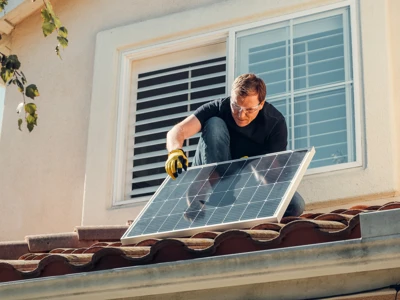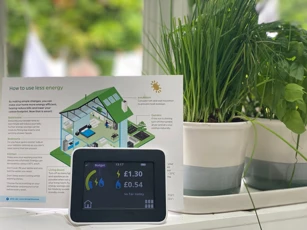Rising energy prices and the cost of living crisis means we’re all trying to tighten our belts wherever we can - especially when it comes to saving energy. We’ve put together a list of our top ten energy saving tips to help you make your home greener without making your wallet lighter.
1. Reduce your food waste
Did you know that we throw away more than nine million tonnes of food every year?1 There are plenty of ways you can reduce your food waste to prevent it from going to landfill, from composting your leftovers to freezing any fruit, veg, and dairy products you don’t get around to eating. While you’re at it, be sure to check your fridge temperature to ensure your food has the best chance of staying fresh. The optimum range is anywhere below 5 degrees Celsius2.
2. Recycle and reuse water
There are many different ways we can recycle and reuse water in our homes. For example, why not switch your current showerhead for one that’s aerated or low-flow? This can help reduce your water consumption by up to 50%, as they regulate the flow of water through the showerhead/add air to the water.3 Washing in cold water can also cut down your energy bills, with more than 90% of the energy used by the washing machine going towards heating the water.4 Your garden could benefit from water reuse, too - whether it’s from old drinking bottles, the water you’ve used to wash your vegetables, or any leftover ice.
3. Redecorate sustainably
If you’ve been considering redecorating, then eco-friendly paints and finishes are the way to go. Low volatile organic compounds (VOCs), natural and organic formulas, and recycled packaging are all things that you should consider when picking out a new paint shade from a sustainable brand. To complement your newly decorated room, you could also introduce soft furnishings - such as carpets and rugs - to help conserve heat and keep warm over winter.
4. Reclaim and reuse building materials
As well as reducing the carbon footprint of your latest renovation project, reclaimed building materials (including bricks, tiles, wood and stone) can often be cheaper than buying new. What’s more, many reclaimed materials will come with a unique finish or design, adding a touch of character to your home that you wouldn’t necessarily get using brand new materials.
5. Turn appliances off standby mode/unplug rarely used devices
Whether it’s accidentally leaving on a charger or leaving a smart speaker plugged in all day without actually using it, the average UK household could be wasting up to £309 a year on extra running costs for appliances that they don’t actually use half the time.5 Even switching devices off standby can help you create a more energy efficient home, saving you up to £147 a year6. This is a simple yet effective action when you consider that as a country, we spend £2.2bn annually by leaving appliances on this mode.
6. Buy eco-friendly, biodegradable household products
Household cleaning products such as polish, washing up liquid, and surface sprays are an essential in your weekly shop, but have you ever given any thought to their environmental impact? Many of the products we use contain chemicals and toxins that are harmful to humans, wildlife, and our ecosystem (as well as being non-recyclable). When shopping, look out for things such as biodegradable packaging and refillable containers too.
7. Keep draughts out
Draught proofing is one of the cheapest ways to save energy in your home. For instance, did you know that keeping draughts out of your windows and doors is proven to save around £45 a year?7 Examples of effective draught proofing measures include:
-
Self-adhesive foam, metal or plastic strips for windows and doors
-
Made-to-measure thermal roller or solar reflective blinds
-
Chimney draught excluders
-
Fillers to block the cracks between skirting boards and walls
Be careful around areas that require good ventilation, such as bathrooms, kitchens, and areas with open fires/flues.
8. Install radiator reflectors
Radiator reflectors will reflect any heat that would otherwise be lost back into the room, reducing the amount of energy required to heat your home and increasing the energy efficiency of your radiators. You can buy these ready made to install, or even make them yourself using high quality reflective insulation if you’re handy with DIY.
9. Increase insulation around your hot water cylinder
Insulating your hot water cylinder and pipes will reduce heat loss, cut down your energy bills, and serve as a much cheaper alternative to fitting a brand new boiler. According to the Energy Saving Trust, topping up hot water tank insulation from 25mm to 80mm thick could save around £50 a year on average.8 Cylinder jackets and foam tubing are quick and easy to install, and are cost-effective options.
10. Regularly service your boiler
Getting your boiler serviced once a year will ensure that any minor issues are identified before they develop into anything more serious or costly, as well as helping you maintain a more energy efficient home. It can also help you lower your heating bill, as it ensures that your boiler is maintained at its maximum level of efficiency, with any built-up deposits cleaned up.
Important information
Your home may be repossessed if you do not keep up repayments on your mortgage.
There may be a fee for mortgage advice. The actual amount you pay will depend on your circumstances. The fee is up to 1% but a typical fee is 0.3% of the amount borrowed.




